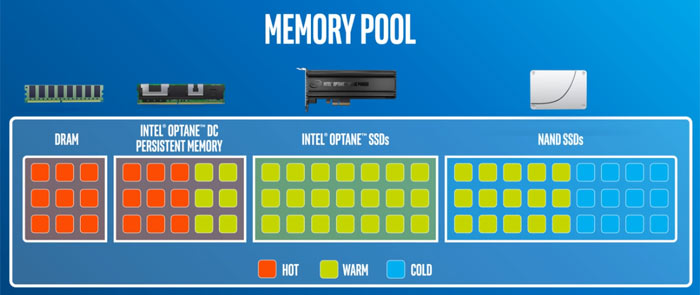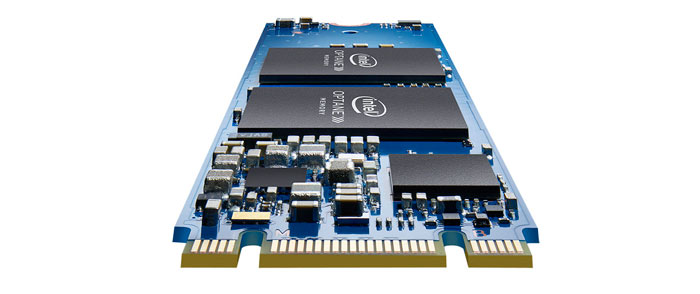Intel likes to talk about its Optane products creating a new memory paradigm. The last time HEXUS wrote about Optane was concerning the sampling of Intel's Optane DC persistent memory with customers, at the end of May. In that article you can see we have reproduced an Intel diagram showing a memory pool, with Optane products bridging the gap between the 'hot' DRAM and 'cold' NAND storage resources, used by a computing system. Previously Intel has used a pyramid diagram to show the potential of Optane.

To be clear, the Intel Optane DC persistent memory, that is closest to DRAM, is yet to arrive. Only its closest partners can test it out at the moment. However, a pair of top PC OEMs appear to be marketing laptops packing Intel Optane 'cache memory' SSDs in a rather unclear, or even deliberately muddied way.
Extreme Tech has spotted both Dell and HP laptop listings with Intel Optane drives pre-installed - adding the Optane capacity figure to the 'memory' spec, rather than the 'storage' spec field. Actually it isn't quite so clear cut. The Dell laptop listing is less clear. It headlines a system as offering 24GB - 1TB. When clicked through to the system configurator it is revealed that the "24GB of Memory: 8GB 2666MHz DDR4 DRAM + 16GB Intel Optane memory." HP's listing is more immediately clear as in the headline it breaks down the 'memory' figure as follows: "24GB Memory: 16GB Intel Optane + 8GB RAM, 1TB Hard Drive".

These 16-32GB Optane cache drives are designed to accelerate a conventional HDD's read-write performance and are explicitly part of the PC storage subsystem. Therefore they shouldn't start getting mixed up in the DRAM spec figures.
Another interesting aspect to this story is how Extreme Tech spotted that Intel has changed its FAQ regarding the difference between Intel Optane Memory and DRAM. Previously it was very clear that you cannot use 16GB of Optane and 4GB of DRAM to meet the requirements of a game that requires 8GB of DRAM, for example. Now it has removed that explanation and claims that "Intel Optane memory is called memory because it uses a new memory media to store information closer to the processor. It’s similar to the function of dynamic random access memory (DRAM)."

In summary, Extreme Tech asserts that Dell and HP are unlikely to have come up with this marketing ploy on their own. Furthermore, the use of the generic term 'memory' and mixing of the DRAM + Optane totals is "cynical and shameful," and that the whole message is "consumer-hostile".













